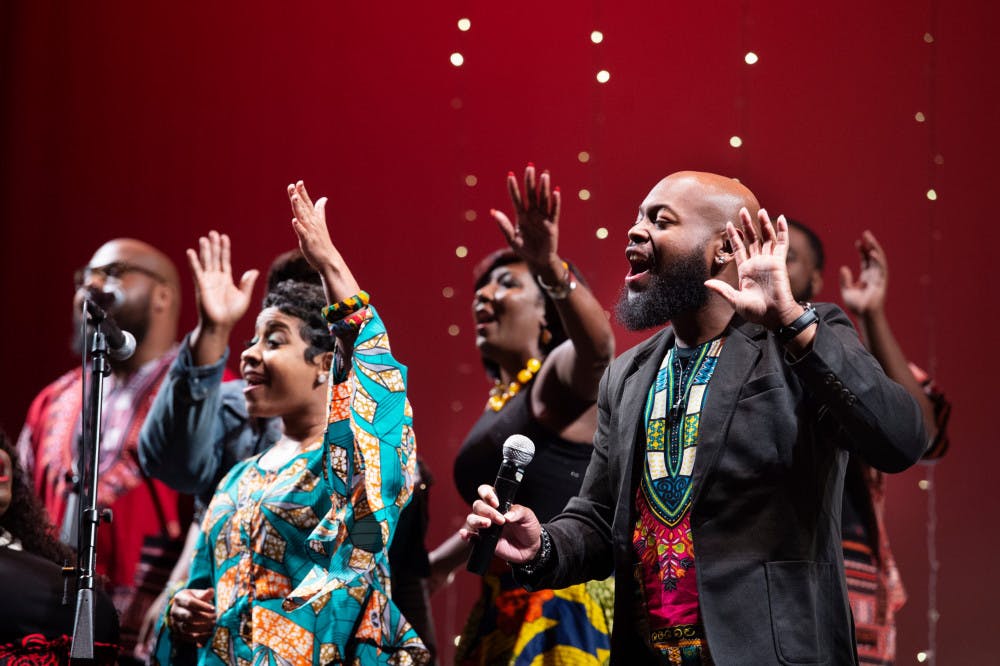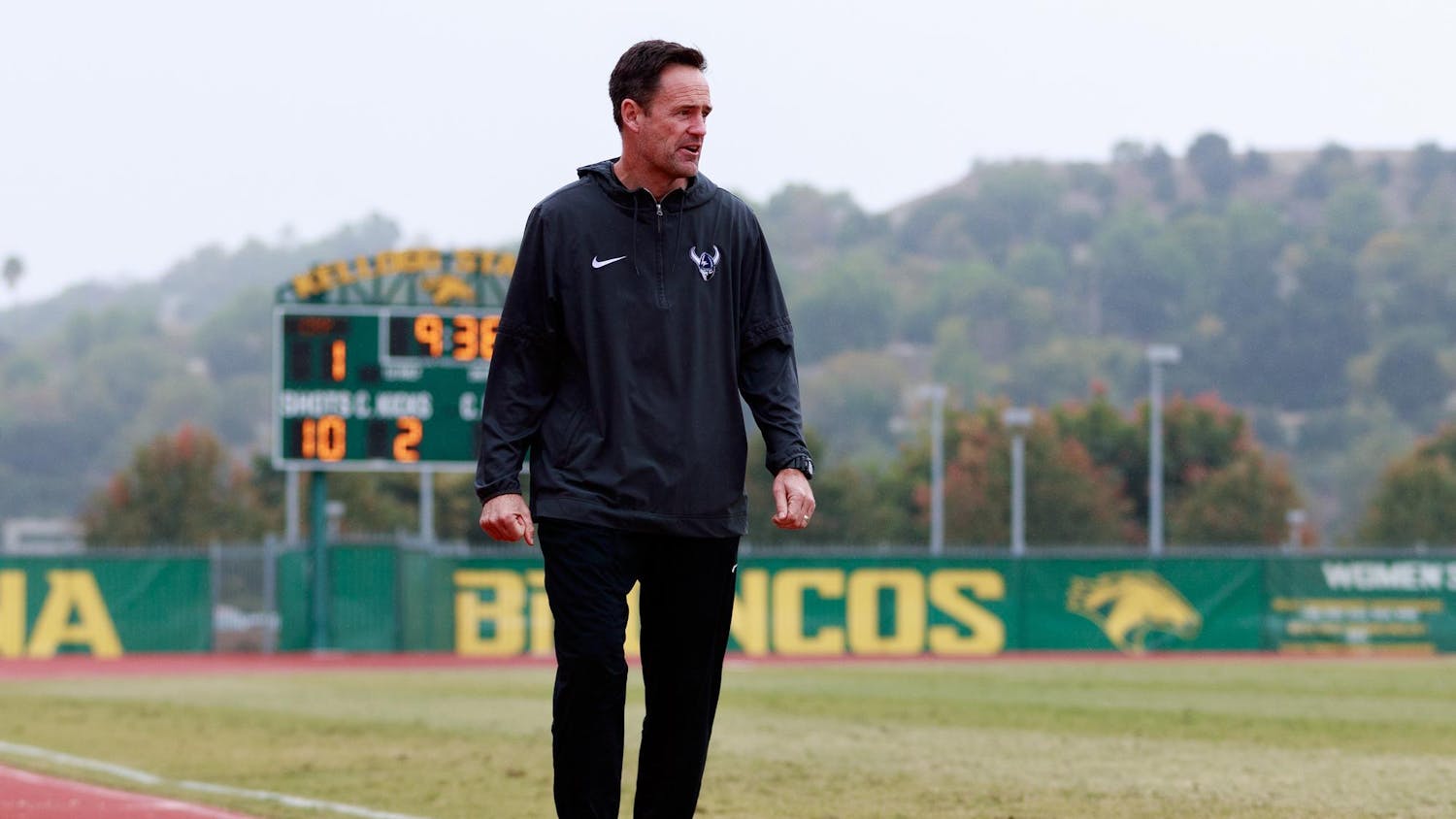Trey McLaughlin workshops address culture, style, what it means to be a musician

Smiling faces and musical harmonies emanated from Zoom screens last Wednesday as Trey McLaughlin worked with students of the Western Washington University choirs.
McLaughlin, gospel music artist and face of Trey Mclaughlin & the Sounds of Zamar, is invited to share and teach in a series of virtual workshops this month. The workshops, which fit into Western’s wider Black History Month programming, are an opportunity for people to learn more about the history and value of Black gospel music.
Angela Kasper, director of Western’s advanced treble and university choirs, said exposing her students to different musical traditions has been a major focus.
“I think this music and music from other cultural traditions should be embedded into the choral curriculum throughout the year,” Kasper said. “But it is exciting to have this celebration where so many guests are brought in, and the rich cultural heritage of African Americans is highlighted for our Western community.”
Kasper said the pandemic has challenged her to find new ways to keep choral music alive in a virtual setting, but inviting guests like McLaughlin has been the perfect remedy.
“I’ve always resonated with [gospel music’s] message and I’ve loved the honesty and the rhythmic impetus and the joy of that genre of music,” Kasper said. “[But] I’ve realized that I’m not the person to be presenting this music to my choirs. I need someone who is steeped in the tradition to come and share with us.”
At the Feb. 10 workshop, McLaughlin shared his experience as an artist who grew up performing music in the African American church.
McLaughlin said gospel music’s rote style of teaching, involving call and response, has created a repertoire that is accessible and easily recognizable within the African American church. Gospel music encourages musical participation and community.
“A lot of the time, the music is based on a passionate message, but also community and worship as community,” McLaughlin said. “It is integral to us because it’s a part of who we are, but it’s also because it’s something that unifies us.”
McLaughlin said many elements of gospel music, like its focus on rhythm, can be traced to African music. The music of enslaved people, including work songs and American spirituals, plays a major role in the history and culture of gospel music.
“My theory is that, if you can sing spirituals, you’ll better understand gospel music,” said Stephen Newby, composer and professor of music at Seattle Pacific University. “We don’t just want to dismiss that the economic development of this country was built on approximately 400 years of slavery.”
Newby said embracing the cultural aspects of gospel music is important in understanding it.
“It echoes the theological narrative of Black people in their faith and in their community,” Newby said. “To ignore the cultural context of this music is to negate its true value.”
Gospel music’s influence extends beyond the African American community, though.
McLaughlin said gospel music has influenced the passion, delivery and style of many other genres like country, blues, jazz, pop, rock and rhythm and blues. Artists who are not typically seen as gospel singers, like John Legend, Whitney Houston and Adele, are just a few whose styles reflect elements of the genre.
“It’s given people the freedom to sing with a passion that’s not quite as controlled as the western style of singing,” McLaughlin said.
That freedom is part of why McLaughlin pursued gospel music professionally.
In college, McLaughlin said his professors urged him to become an opera singer because it would offer a clearer route to a “successful” music career. While McLaughlin enjoyed opera, he said it had limitations.
“There’s nothing you can put on sheet music that’s going to give you soul,” McLaughlin said.
McLaughlin made it clear how much he values classical music.
“It is an art form, and it’s very expressive and beautiful in its own way,” he said, noting how his classical training and knowledge of theory have helped him as a musician.
But as he has found, classical music is not the only way of achieving.
“I think you’d be surprised at how many professional artists there are that we respect and revere who don’t really know much about classical music,” McLaughlin said. “I think that the western way of thinking in terms of music is that classical music is the best and it’s the end all be all ... but it’s not necessarily the only thing out there.”
McLaughlin is not alone in this mentality. Western music students have also noticed the potent reverence classical music receives.
Kelia Fields, a third-year music education major, said she’s always loved pop music. As a singer-songwriter, she said at first she didn’t consider majoring in music because she wasn’t sure she’d fit in with Western’s classically-dominated music program.
Fields said she’s had a few opportunities to learn about other styles and cultural traditions of music through workshops organized by Kasper and classes like world music. But to her, Western’s music program could be more diverse.
“I think it’s just important to know — for anyone who enjoys music — that you’re not not an artist or not a musician just because you don’t know everything,” Fields said. “There’s no one way to do everything, and music is constantly evolving.”
Clarkia Cobb, a graduate student pursuing a masters in music education, felt similarly.
Cobb, a jazz musician who runs her own voice studio in Seattle, recalled auditioning for a choir program and being told her vocals were not “up to par” classically, despite her years of jazz experience.
“I really struggle with all of the biases that are in classical music and that are very much ingrained in the education system within it,” Cobb said.
Cobb said jazz requires different strengths than classical music, like a better understanding of harmony, theory and improvisation which often makes it feel more diverse and inclusive.
As a music educator, it’s important to embrace music styles from many different cultural backgrounds, Cobb said.
“All forms of music need to be celebrated, performed and expressed,” Cobb said. “If you only teach to the white kids, that’s not going to create a sense of security and safety, and in so many cultures that’s what music is, it’s this coming together.”
Patricia Campbell, professor of music education and ethnomusicology at the University of Washington, said at most four-year institutions western art music is still the emphasis.
However, there is a growing effort to diversify the field.
“We see changes coming. They’re kind of slow to come, but they are coming,” Campbell said.
Professors like Kasper are helping to make those changes.
“We should be presenting all of these traditions in a way that lets students know that what has traditionally been done is just one spoke of the wheel,” Kasper said. “And we honor that spoke of the wheel but we show them and help them experience all spokes of the wheel.”
When it comes to teaching music from different cultures, Campbell said many are taking care to not just study the music, but to understand the musicians, their experiences and motivations.
A big part of understanding is learning directly from people who identify with those cultures, Campbell said.
Newby said when he directed SPU’s gospel choir, he would encourage students to take part in an African American worship service, and sing and learn with those communities.
“You have to let African American leadership lead, to bring people together and bring them to the table,” Newby said.
McLaughlin said the difference between paying homage and appropriation is that paying homage gives proper credit to the people and cultures the music came from.
McLaughlin hopes his workshops on gospel music will help students understand music is a personal expression. Music styles do not have to be in competition with one another.
“If classical music is not their main thing or if it’s not something that they’ve always been exposed to that, who they are musically is good, it’s great, it’s genius,” McLaughlin said.
Cultural musical traditions like gospel offer hope, Newby said.
“[Gospel] speaks to faith, hope and love,” Newby said.“Martin Luther King speaks about the beloved community, and I think this music can serve as a way to bring radical reconciliation to the world.”
For Newby and many others, learning about traditions and contributions from different communities — musical or otherwise — is important.
“When we learn more about each other’s stories, we have greater respect for one another and we make the world a better place,” Newby said.
Interested in future sessions? Here's how to access them!
Monday, Feb. 22, 1:00 - 1:50 (live) https://wwu-edu.zoom.us/j/99708620573
Monday, Feb. 22, 2:00 - 2:50 (recording) https://wwu-edu.zoom.us/j/99759877412
Tuesday, Feb. 23, 2:00 - 2:50 (recording) https://wwu-edu.zoom.us/j/94623019114





